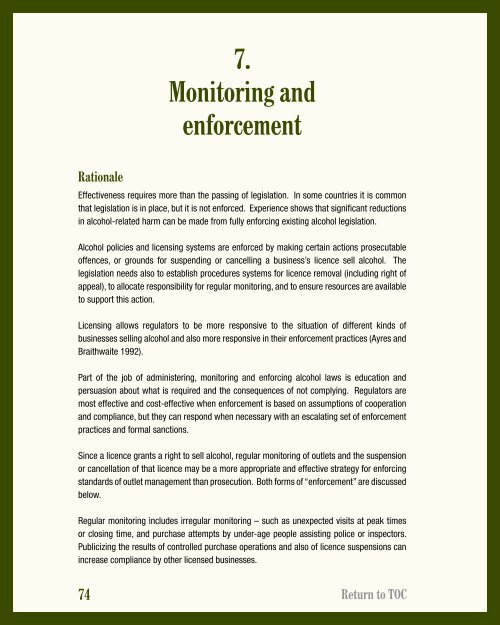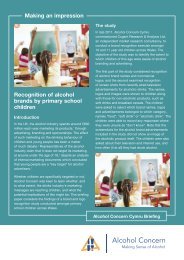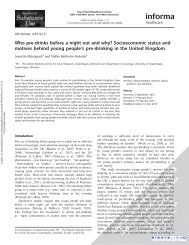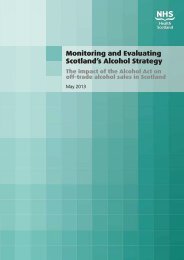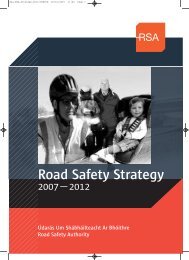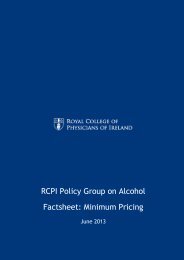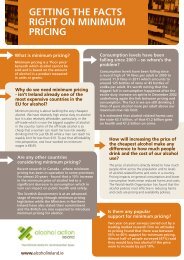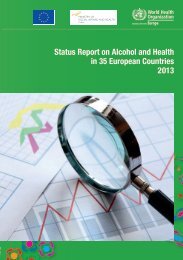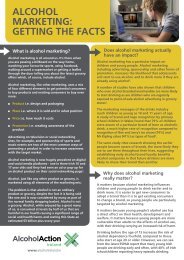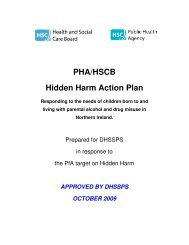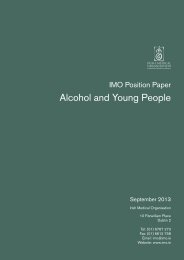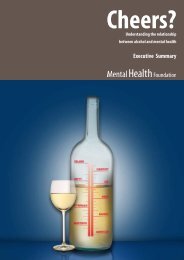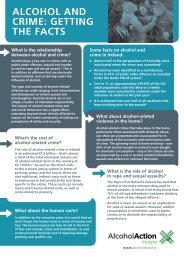Addressing the harmful use of alcohol - WHO Western Pacific Region
Addressing the harmful use of alcohol - WHO Western Pacific Region
Addressing the harmful use of alcohol - WHO Western Pacific Region
You also want an ePaper? Increase the reach of your titles
YUMPU automatically turns print PDFs into web optimized ePapers that Google loves.
7.<br />
Monitoring and<br />
enforcement<br />
Rationale<br />
Effectiveness requires more than <strong>the</strong> passing <strong>of</strong> legislation. In some countries it is common<br />
that legislation is in place, but it is not enforced. Experience shows that significant reductions<br />
in <strong>alcohol</strong>-related harm can be made from fully enforcing existing <strong>alcohol</strong> legislation.<br />
Alcohol policies and licensing systems are enforced by making certain actions prosecutable<br />
<strong>of</strong>fences, or grounds for suspending or cancelling a business’s licence sell <strong>alcohol</strong>. The<br />
legislation needs also to establish procedures systems for licence removal (including right <strong>of</strong><br />
appeal), to allocate responsibility for regular monitoring, and to ensure resources are available<br />
to support this action.<br />
Licensing allows regulators to be more responsive to <strong>the</strong> situation <strong>of</strong> different kinds <strong>of</strong><br />
businesses selling <strong>alcohol</strong> and also more responsive in <strong>the</strong>ir enforcement practices (Ayres and<br />
Braithwaite 1992).<br />
Part <strong>of</strong> <strong>the</strong> job <strong>of</strong> administering, monitoring and enforcing <strong>alcohol</strong> laws is education and<br />
persuasion about what is required and <strong>the</strong> consequences <strong>of</strong> not complying. Regulators are<br />
most effective and cost-effective when enforcement is based on assumptions <strong>of</strong> cooperation<br />
and compliance, but <strong>the</strong>y can respond when necessary with an escalating set <strong>of</strong> enforcement<br />
practices and formal sanctions.<br />
Since a licence grants a right to sell <strong>alcohol</strong>, regular monitoring <strong>of</strong> outlets and <strong>the</strong> suspension<br />
or cancellation <strong>of</strong> that licence may be a more appropriate and effective strategy for enforcing<br />
standards <strong>of</strong> outlet management than prosecution. Both forms <strong>of</strong> “enforcement” are discussed<br />
below.<br />
Regular monitoring includes irregular monitoring – such as unexpected visits at peak times<br />
or closing time, and purchase attempts by under-age people assisting police or inspectors.<br />
Publicizing <strong>the</strong> results <strong>of</strong> controlled purchase operations and also <strong>of</strong> licence suspensions can<br />
increase compliance by o<strong>the</strong>r licensed businesses.<br />
74 Return to TOC


